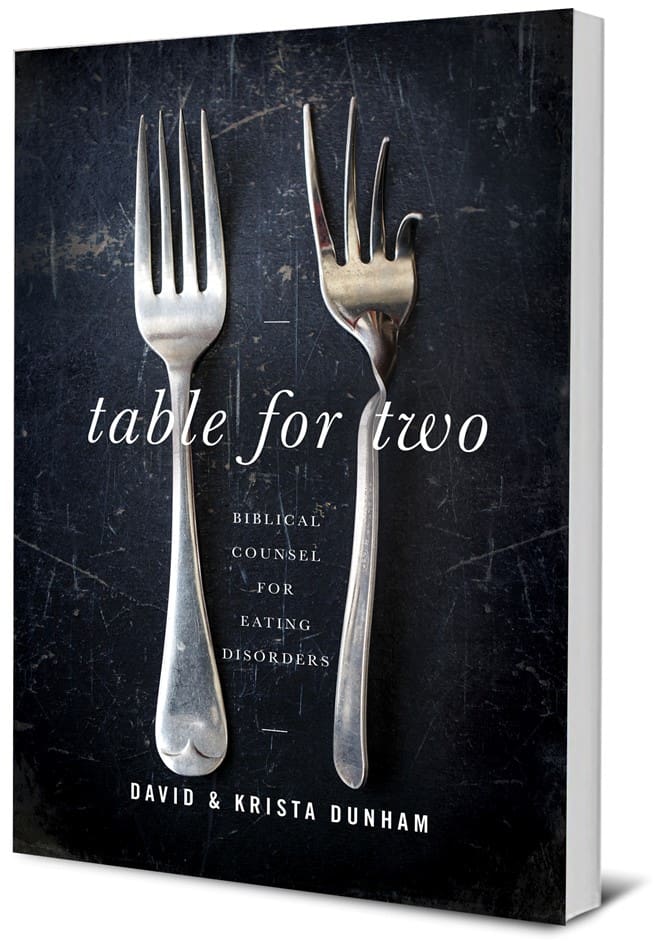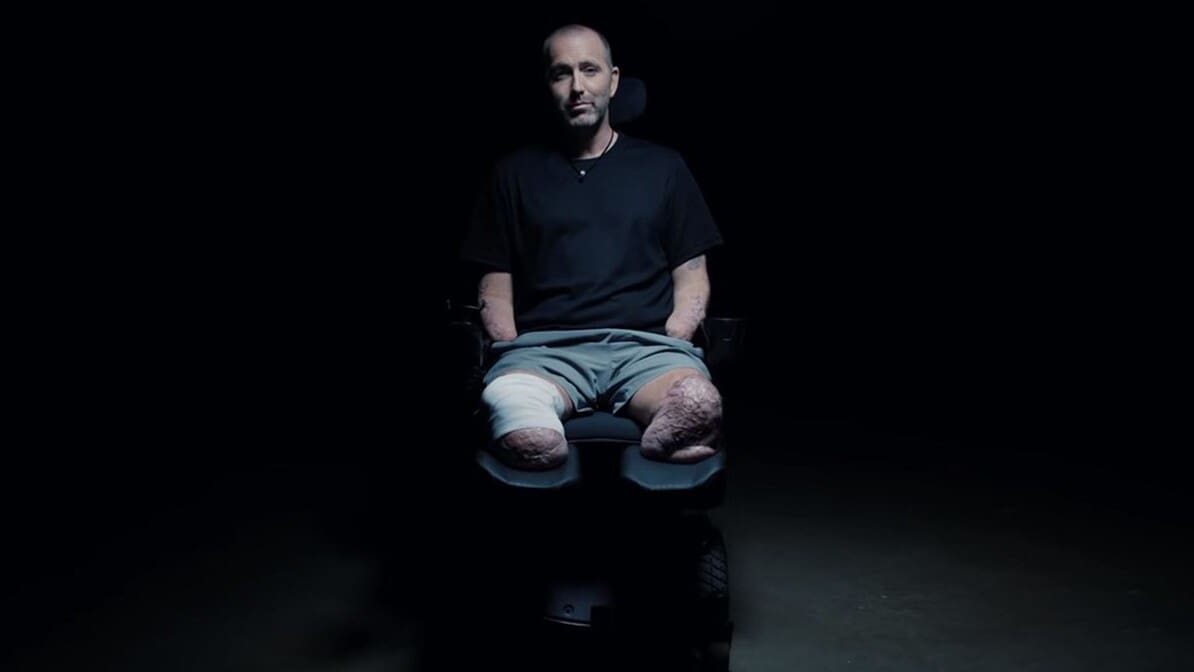
Table for Two: Biblical Counsel for Eating Disorders
 Excerpt from Table for Two: Biblical Counsel for Eating Disorders by David & Krista Dunham
Excerpt from Table for Two: Biblical Counsel for Eating Disorders by David & Krista Dunham
Chapter 4
Dealing with Core Issues
Coming to understand your own heart and the depth of your own motivations is not easy. It can be particularly upsetting to see how deep an eating disorder goes in our own lives. If you are feeling discouraged or hopeless, don’t quit. Understanding the problem is just the first step. There is great hope for change still to come. Be encouraged by the stories of others who have traveled the path of recovery. Jessica was a young college student stuck in the cycle of binging and purging and excessive exercise. She was so consumed by this dynamic that she barely finished college. Through counseling and by God’s grace she was able to overcome. She is now working as a school teacher, serving in her church, and living in freedom today!
Kelly loved the Lord and faithfully served in her church, but for years she secretly harbored destructive eating habits. As she began to approach forty, the need to finally and fully deal with her eating disorder began to weigh on her. Through counseling, working intently with a dietician, and confessing her struggles to others, she found freedom for the first time in nearly two decades.
We want you to hold on to hope because the God who exposes our heart motives is also the God who delights in and is devoted to changing us and leading us, ultimately, into “the freedom of the glory of the children of God” (Romans 8:21).
Paul reminds the Philippians of the remarkable truth that God is committed to our growth, when he says, “And I am sure of this, that he who began a good work in you will bring it to completion at the day of Jesus Christ” (Philippians 1:6).
God does not leave half-finished projects. What he starts he finishes, and that includes our personal growth. God doesn’t expose our motivations in order to condemn or discourage us, but to help us see how food, or thinness, or control can never satisfy us. Instead, he invites us to see how he wants to provide for us and to come to him with our needs. We can confront our motives with the truth of God’s character and his promised provision. It is through confronting those motives that we can move towards greater freedom from eating disorders.
Krista’s Story
I had honestly thought that my problems would be over after I transferred schools. I was convinced that I was only struggling because of my circumstances. At my old college, I was away from my boyfriend and I was stressed about grades. At my new school I knew the classes would be easier and that I could walk over to David’s dorm whenever I wanted to. Changing schools sounded like a simple way to fix my issues.
But as you can probably guess, nothing really got better. New problems arose. Even though the classes were easier, I still wanted to perform with absolute perfection. Even though David was right next door, I soon discovered that he alone couldn’t possibly fulfill all my social needs. I had counted on him to fill in the emptiness with his constant presence, but my expectations were overinflated. On top of all that, the campus was huge. There were ten times more students at the university than at the small college I had been attending. I found it impossible to make friends. I felt lost and alone.
All of my deep insecurities and frustrations followed me. I tried to outrun my issues, but they stuck with me because, deep down, they weren’t really based on my circumstances. They had everything to do with my deeply-rooted thoughts and emotions: pride, control, perfectionism. These were the root issues that had caused me to start all the destructive behaviors. The only way I was going to actually get any better was to confront these issues.
As I mentioned, it took me years to reach a readiness to face my enslavement head-on. Our pastor did help me to confess and bring sin out into the light, but he was aware of his shortcomings, especially in the realm of eating disorders. As I mentioned in the last chapter, this is when we began assembling a team of specialists to help me. He put me in contact with a counselor who helped me to start fleshing out emotions and motivations. She worked with me to develop better strategies for structuring my life and thinking. Our pastor also pointed me toward a compassionate medical professional who assessed my physical well-being at the beginning of my recovery journey and stuck with me through the process of achieving better physical health. She was also able to prescribe medication that was helpful in stabilizing my emotions for a period of time so that I could establish traction in my recovery. Through this multifaceted team, I was able to start toward the ultimate goal of wholeness and freedom in Christ. If you need assistance in locating medical, nutritional, emotional, and psychological help I would encourage you visit the National Eating Disorder Association’s website at www.nationaleatingdisorders.org.
I also found it particularly helpful to find a biblical counselor to join the team of people who were providing me with care. Many biblical counselors offer their services for a donation so this would add little to the financial strain that you and your family may already be experiencing. I benefited greatly from having someone who would meet with me regularly to sort through the mix of sin and suffering in my story by pointing me to the Word of God. We are complicated beings. Our emotions are hard to understand, and our motives are not always clear to us or others. The Bible even tells us that our hearts are deceitful (Jeremiah 17:9). But God knows all of that and so he gave us his Word as the best resource to address our situation when things go awry. A good biblical counselor can open up God’s Word with you and point you to the most effective biblical strategies to help you overcome the issues that are lurking in your heart.
Secondly, in order to flesh out hidden issues, I found it helpful to write out my story. I’ve given my testimony many times and have had to make note of different areas of my life associated with my eating disorder. I have found this writing process to be beneficial in creating a clearer picture of what is in my heart. I’ve included a structure that might be useful to follow as you work through the details of your struggle with an eating disorder. It is based off of the outline that I actually used to write this book. As I wrote out the details of my story to form an outline for writing, I started to see patterns of behavior in the way I dealt with life. I saw pride in the way I never asked for help nor shared about the pressures I felt as a teenager. I saw myself wrestling for control in the way I didn’t want to play games as a child unless I could win. I saw perfectionism in how I always needed my outfits to match. Seemingly small and insignificant details can give us clues to reveal the deepest root of the sin that we see manifested in our behaviors. Writing also gave me the opportunity to connect my food issues with areas of suffering. I never made the connection that my eating disorder was partially in response to the trauma of my car accident until I noticed how closely these events were in the chronology of my life.
Here are a few things to think about as you write out some key points from your life story. Don’t let all the information overwhelm you. You may find that you are able to see the broad picture if you write quickly without dwelling deeply on each event individually.
…
Order a copy of Table for Two: Biblical Counsel for Eating Disorders by David & Krista Dunham
Excerpted from Table for Two: Biblical Counsel for Eating Disorders © 2021 by David and Krista Dunham. Used with permission of New Growth Press. May not be reproduced without prior written permission. To purchase this and other helpful resources, please visit newgrowthpress.com.
Trending Now
Sign up today for your Inspiration Today Daily Newsletter
Supercharge your faith and ignite your spirit. Find hope in God’s word. Receive your Inspiration Today newsletter now!
David & Krista Dunham
David Dunham, MDiv, is a pastor and biblical counsel at Cornerstone Baptist Church in Roseville, MI. He speaks regularly on issues related to biblical counseling. Krista Dunham has served as a woman’s mentor, biblical counselor, and curriculum developer for various women’s and children’s ministries. She has a degree in early childhood education from Ohio University. David and Krista have three children and live in Michigan. Learn more at pastordaveonline.org
Related Articles
January 28, 2026
I Just Knew It Was God: From Searching to Finding Faith
From the outside, Ekaterina’s life looked successful. She had a college degree, a strong career,…
January 26, 2026
How to Overcome Old Wounds with Resilience
How Do You Deal with Old Wounds? Everyone is talking about trauma, but very few are talking about…
November 21, 2025
Thank You … Lord
Gratitude transforms our lives and draws us closer to God. This article explores how practicing…
October 27, 2025
So, Is God Good?
Many people wrestle with the question, is God good, especially when life brings pain and loss.…
Next Steps To Strengthen Your Walk
Inspiration Today Newsletter
Supercharge your faith and ignite your spirit. Find hope in God’s word. Receive your Inspiration Today newsletter now!
Christian Articles
Find articles to strengthen your walk and grow your faith. We have a wide range of topics and authors for you.
Submit A Prayer Request
We are here for you. Simply click on the button below to reach us by form, email or phone. Together we will lift our hearts and voices with you in prayer.





